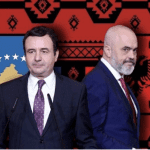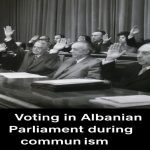By Genc Pollo
During the 2005 general election campaign, a senior opposition figure stated that in the event of his party winning, Albania would join the European Union within five to six years. The government of the time, more reserved in this matter, retorted it would take a few more years; of course with them sa a safe pair of hands. Today, sixteen years later, no contestant in the ongoing general elections campaign is trying to promise a timing of the country’s future membership in the Union. The government presented itself as the usual safe pair of hands having done the EU required homework and ignoring the embarrassing the EU imposed additional conditions. Curiously, for the first time since Communism, Europe is wholly missing in their campaign issues. The opposition is making the EU a central campaign feature promising the real start of membership negotiations within this fall. But pay attention: no one talks about the prospective year of our EU accession anymore!
Undoubtedly, within the EU, scepticism towards potential members from the Balkans has also increased for internal reasons. But a main cause for it remains the troubling state of basic norms in our region starting with human rights, rule of law, separation of powers, government accountability and so on. Or, in the language of the EU treaties, the Copenhagen Criteria. In his well-known article “The Plantagenet Effect”, the American scholar Robert Kaplan notes that it took England eight centuries to develop the current tradition and culture of the rule of law and democracy. He explains the failure of the “Arab Spring” (2010) to achieve functioning democracies with the lack of such an original tradition.
Of course, the Balkans cannot be compared to the Arab situation, just as it can be said that the institutional-democratic tradition of the region has deficits compared to the rest of the continent. But the Balkans also have a chance that similar regions in the world don’t: being a geographical enclave within the EU and enjoying the EU’s commitment to help with Copenhagen Criteria. The EU has committed an enormous political and financial potential but this needs to be put to good use.
Until recently, Montenegro and Serbia were considered EU integration forerunners. Montenegro opened and closed chapters with the European Commission, but, in fact, the state was captured by the ruling party holding uninterruptedly power for three decades (albeit a party with historical merits). The recent change of government at the ballot box, despite the geopolitical irritants, is an opportunity for “uncapture”. Serbia resembles Albania with her criminalized segments of state power and generalize capture of the state; there too the Parliament ended up fully filled with ruling party deputies after an ill-considered election boycott by the opposition. Bosnia &Herzegovina is a dysfunctional federation and its constituent entities are ethno-party feuds lacking checks and balance and change of the ruling party. North Macedonia, in the fifth year of the current government, is increasingly showing the problematic syndromes of the previous government. Kosovo, despite similar problems, hopes for progress with the new government.
International reports such as Transparency International/IDM recently would suffice to display for Albania’s problems in this regard; even if we did not know those facts from living here. Improving this situation is of course the responsibility and duty the respective societies, their elected politicians and other actors. But in the circumstances where EU membership may take a decade or more, the major question is what should the integration process be like? How should it be designed in order to serve the interests of the European Union as well as those of the six Western Balkan countries?
I guess we can easily agree that the primary interest of the six is the progress with and consolidation of the Copenhagen Criteria. The same should be also the primary interest of 27 European countries which need to have a continental enclave ruled by (European) law and not by semi gangsters in suit and tie. Semi gangsters who offer a facade of stability which in fact risks leading to a chaotic destabilization or paving the way for unfriendly powers.
The big question is whether the current integration process is the right one. It focuses a lot on the approximation of national laws to the EU acquis. Mostly on paper, not so much in real implementation. These laws are absolutely essential to one day be a member, but does it make sense to focus so much on them when at the same time, the government becomes a recidivist in violating the Constitution and many key laws. Also, the EU finances with millions of euros strategies and processes where the implementation and outcome are not always clear.
The recent years experience in Albania has seen EU effective help achievements like with reaching the Agreement on Decriminalization (ie purging former criminals from public office) (2014) or the one Electoral Reform (2020); but the EU silence on Tahiri-Cannabisation (2016) or statements in favor of the abusive demolition project of the National Theater (2019) by certain European Commission officials should be noted as serious failures. Not to mention thoughtless gestures like the EU sponsored “Run against corruption” (2020) where European diplomats jogged smiled alongside scandal ridden ministers on lakeside near Tirana. A gesture that was rightly ridiculed by the public.
While the negative examples can be kindly explained by the bureaucratic culture, formalistic approach and discreet operations typical of the EU executive. This Brussels mentality may have been appropriate when dealing with membership of Sweden or Austria in the ‘90s. In the latitudes of the Balkans and in the contemporary world, it needs to be revised, advancing from “discretion” to “intervention”. Towards a more “American” approach if I may say so. Not by intervening in the place of local political and social actors, as this would hinder their emancipation and development. But the EU needs to maintain a clear and vigilant stance whenever the Copenhagen Criteria are violated. This encourages local advocates of European standards. Be they professional politicians, social activists or freelance journalists. The direct and public support of the latter from the EU would be an even stronger and more effective aid. And there are still other ways and means. But it would call for a policy shift towards more activism or interventionism.
According to a half-true cliché, Americans are result-oriented, while Europeans are process-oriented. In our case it seems key to define the result. At a time when EU membership appears vaguely on the horizon the result of the European integration process can be redefined as consolidation of the Basic Foundations (ie of the Copenhagen Criteria). Such a debate seems to have started in Brussels. But last month, when the European Parliament approved the report on Albania, a Socialist MEP declared that the problematic media law had been repealed, fulfilling the last EU condition for convening an Intergovernmental Conference. Of course, this is untrue, as the legislation is still pending in Parliament and theoretically it can be approved or rejected any time. The fact that another Commission official repeated this untruth probably proves that the debate on a more effective approach and its adoption may take longer than hoped for.
Genc Pollo is fmr. Deputy PM, Minister of Education, Minister of Telecom & IT and fmr. Chairman of the Parliamentary Committee on Education and Media and also of European Integration.
Tirana, Albania










